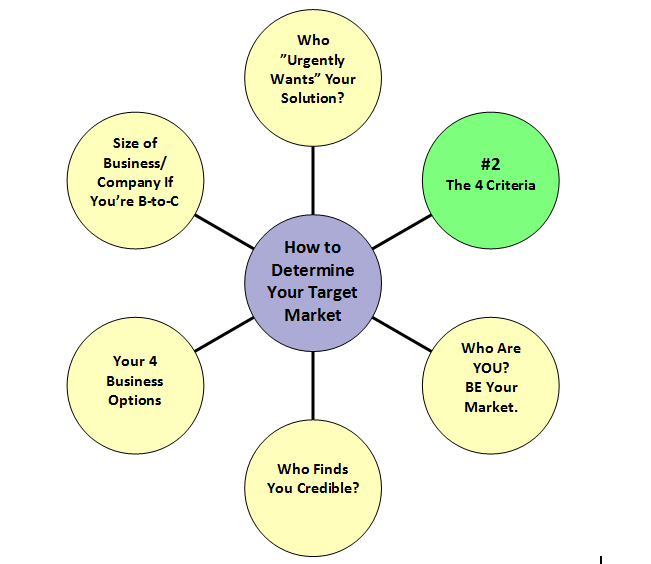This is the 2nd in a 6-part series on mastering who your sliver-population market is. I’ve said to my students and clients for years that your market *is* your business. Without a market, you have either an unwieldy, undefined business or you have no business at all.
It is your market that will determine how you sell to them–the communication that will actually work.
Your market that will determine the free and paid programs you offer.
Your market who will create your expert-status.
Your market who will make you money.
And your market who will determine your destiny. If you are here to change the world, it is only a very segmented population that will help you do it.
There are many things I ask my private clients that enable them to take the vital step of shaping their all-important market, and recently, I’ve been directing them with these 6 tools. Today, I’m giving you the 2nd one.

2. The 4 Criteria
I have found these 4 questions quickly answer whether or not a market is a smart decision. You need to have a sense of a market in order for this to help, but once you have an idea of one or even two markets, measure your options (independently) against these 4 criteria:
On a 1-10 scale (0=not at all; 10=extremely), how would you rate your TM option on the following:
1. How “on the surface” is their awareness of their pain?
2. How credible are you to them? (They would believe you; respect you; resonate with you.)
3. How passionate do you feel when you think of working with them?
4. How able are they to pay for you?
Every single one of these is important.
And you want to be answering at an 8 (lowest), and preferably a 9 or 10.
If a market is a 9 or 10 in awareness of their pain, this is very good. It means they have an urgent need, and your business *must* be “urgently wanted”–or you will simply sit on the shelf as a one-day possibility (if you’re lucky.) Sound familiar?
You are credible to a market if you have been through what they are going through; if you have overcome what they’re in the midst of; if you express beliefs that immediately align with theirs. If you are an 8-10 in credibility, there is a high likelihood that they will buy you.
You must be at a 9 or 10 in passion for your market. If you are a follower of mine, you are here to effect change in the world and must want that change for a particular segment far more than for any other segment. You must be passionate about what you see is possible for them; what you think they’re here for–after all, you’ll be helping them get it. I am off-the-charts passionate about visionary entrepreneurs, those who are here to inspire change. I could do what I do for corporations, but I believe the world should be run by entrepreneurs, so I have no interest in helping executives. I used to work with any type of coach and consultant, but then decided that I only had interest in working with those who want to have a powerful impact in the world. I believe they have a purpose on the planet at this time and am extremely passionate about that and them. So, they are now the only type of service provider I work with.
And finally, needless to say, you want your market to be able to pay you at an 8, 9 or 10 level. If you answer anything lower than an 8, you will pay for it.
So, what are your answers when you take yourself through all 4 criteria?




 The pain I hear in their voice runs deep.
The pain I hear in their voice runs deep.